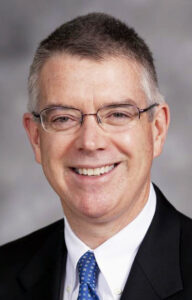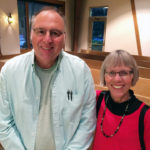By Dr. Tim Millea
Catholic Health Care Today
Bishop James Conley noted an interesting trend this year as he confirmed young Catholics throughout his Diocese of Lincoln, Nebraska. An unusually high number of girls selected St. Joan of Arc as their confirmation patron, prompting Bishop Conley to ask one of them about her selection. The young girl’s reply was quick and revealing: “Because, Bishop, Joan was a very brave girl. And I don’t want to be afraid anymore.”

This comment struck him, coming from such a young person, but he recognized the truth behind it. We live in a time of unprecedented anxiety, as evidenced by the dramatic increase in the number of people dealing with mental health concerns. Her young wisdom was clear: only courage can overcome fear.
That conversation was the conclusion to Bishop Conley’s remarks at the Catholic Medical Association’s (CMA) 92nd Annual Educational Conference held in Phoenix in early September. The theme for the three-day conference was “Be Not Afraid: Courageous Catholic Medicine.” This gathering of more than 750 Catholic health care professionals, ethicists, clergy and religious from around the world centered on the importance of courage in the practice of ethical and moral medicine in our secular world.
Immediately following Bishop Conley’s reflections on the “Theology of Courage,” Chris Pries of St. John Vianney Parish in Bettendorf offered a thoughtful perspective on the psychology of courage from a Catholic Christian viewpoint. Monsignor Mark Merdian and Dr. Greg Tudor, both of the Peoria (Illinois) Diocese, also spoke. Msgr. Merdian discussed the need to recapture Catholic principles in health care administration while Dr. Tudor’s story of tragedies and redemptions as a physician, husband and father provided a moving example of unexpected blessings and graces.
Several speakers have previously spoken at our local St. Thomas Aquinas CMA Guild during meetings after the annual White Mass. Dr. Wes Ely from Vanderbilt emphasized the need for Christian humanism at the bedside. Dr. Robin Goldsmith of the St. Gianna Clinic in the Green Bay (Wisconsin) area spoke of the need for growth in authentically Catholic primary care. Dr. Natalie Rodden King spoke about the unethical and misguided promotion of assisted suicide, contrasting that approach with the appropriate approach, seeing Jesus in every patient and treating them with dignity, love and respect.
Altogether, the conference’s nearly 60 presentations encompassed a wide variety of pertinent topics: Catholic Social Teaching, Theology of the Body, conscience rights and religious freedom, Catholic medical missions, brain death, and gender identity issues. The unifying current permeating these topics: health care requires Catholics to take courageous action, now more than ever.
The annual conference is consistently a combination of education and spiritual retreat. Each day starts with Morning Prayer and Mass before the educational session begins. A 24-hour Adoration Chapel is open throughout the conference and consistently in use, even in the wee hours of the night. Faith, formation and fellowship are integral experiences each year. The added emphasis on spiritual fortitude at this event only strengthened these factors.
Faithful Catholics working in health care say they are experiencing increasing threats and actions because of their beliefs and values. Physicians and other clinicians report losing their jobs for refusing to provide abortions, sterilizations, contraceptives and other unethical interventions. They see career advancement thwarted if they state any concerns about the harms of transgender interventions. Their opposition is not to the person dealing with gender identity concerns but to the procedures and methods used in transition, such as puberty blockers, cross-sex hormones and surgery. Yet, these health care providers persevere, setting the example of St. Thomas Aquinas’ recognition of courage as “the necessary virtue.”
Despite the challenges, the conference revealed much hope and optimism for growth in truly Catholic-centered primary care. More than 75 med students and residents attended the event, a record. This dynamic group of bright and faithful individuals are the future of Catholic health care and that future is hopeful.
They and their peers — and those who follow them — need our ongoing encouragement and prayers. Their courage and devotion to medical care as Christ intended is critical and so is ours. We must continue to show up, stand up and speak up for an ethically sound society, in medicine as well as all other spheres of life. There is a reason that variations of “be not afraid” are the most common phrases in sacred Scripture. Courage is contagious and we must spread this virtue widely. We are called to follow the admonition of St. Catherine of Siena: “Start being brave about everything, driving out darkness as well as spreading light. Don’t look at your weakness, but realize that in Christ crucified you can do everything.”
(Dr. Tim Millea is president of the St. Thomas Aquinas Medical Guild and a member of St. Paul the Apostle Parish in Davenport.)











